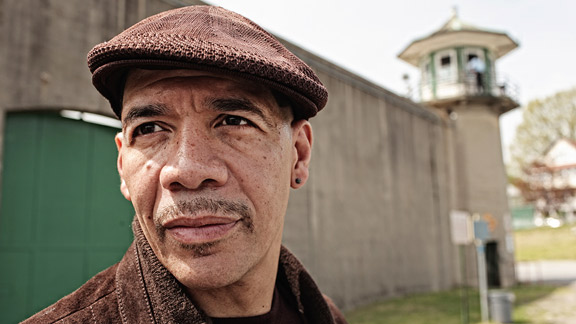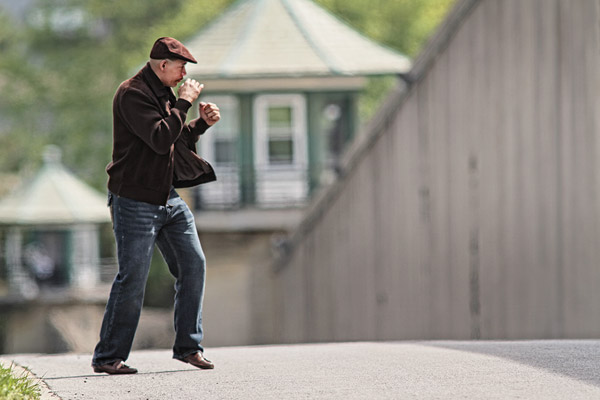Read this story if you really want to fall back in love with our legal system
Dewey Rader Bozella, winner of the 2011 Arthur Ashe Award for Courage, was sent to prison in 1983 for a murder he did not commit. But Bozella never stopped fighting and won his release in 2009.
Nobody has ever bought a jersey with the name Dewey Rader Bozella on it. There are no sneakers embossed with a DRB logo. Few people in the world of sports have ever heard of Dewey Rader Bozella.
But a week from today, Dewey will step on stage at the ESPYs to speak.
Naturally, he's a little nervous about it. Millions of people will be watching on television. And he'll be at the podium for three to four minutes. That's a long time for an awards ceremony -- though nowhere near long enough to tell all that needs to be told. Maybe it's simply enough that Dewey speaks and is heard.
For many years after he was first suspected of murder in 1977, it was hard for Dewey to talk about it. Murder is actually a kind way of describing what happened.
Dewey was suspected of entering the home of a 92-year-old woman who had just returned from playing bingo at St. Joseph's Church in Poughkeepsie, N.Y., binding her with electrical cord and stuffing 5 feet of cloth down her throat with a tool resembling a chisel until she suffocated.
There were no fingerprints of Dewey's at the scene of the crime. In fact, there was no physical evidence at all to suggest he had ever entered the home. That's because Dewey was bicycling alone miles away when the murder took place.
But Dewey was arrested. If prosecutors were looking for a suspect with a troubled past, they certainly had a good candidate. When he was 9 years old, Dewey saw his father batter his pregnant mother. His mother died from the beating, and his father ran away and never came back. Dewey and his nine siblings grew up in a series of foster homes.
One of his older brothers had a knife stabbed through his heart and out his back. Another brother would be shot dead through the head. A third would die of AIDS. As a teen, Dewey had a reputation for running the streets, fighting, getting high and committing petty crime. He'll be the first to admit he was no saint.
It was a blessing, then, when the case against him was dropped for lack of evidence. It made Dewey realize he needed to turn his life around. He was 18 years old. He enrolled in community college and got a job at an institution caring for people who back then were called "retarded."
In 1983, six years after the murder, two inmates told prosecutors that it was Dewey who'd murdered the old woman. They lied because it enabled them to cut deals that would get them released. The brother of one of those inmates also pointed a finger at Dewey for support. In 1983, Dewey was charged with murder.
There's no evidence, Dewey's lawyer told him. The prosecutors have no case. It's your call, but you'd be wiser not to testify.
It was sound advice. That way, Dewey's past on the streets couldn't be brought up to sway the jury. And there was no way he could be tripped up under questioning. Dewey decided not to take the stand. He sat stunned while the three "witnesses" turned on him and the jury's verdict was announced: Guilty.
Dewey was sent to Sing Sing. He had a right to be bitter, and he was. The hardest part was he had to stuff his bitterness inside. There was no way to let it out. Ask him what he was in for, and he refused to say. He knew that even people who've done horrible things don't like a man who has suffocated a 92-year-old woman after she's come home from a night of bingo at church.
Once Dewey did tell an inmate about the case. The inmate spread it around as a way of softening the sound of his own crime. Dewey felt shamed, and he resolved never again to say a word about why he was in prison.
It was "The Death House" that saved Dewey. "The Death House" is the nickname for that building at Sing Sing where electrocutions once took place. The electric chair had been removed and a boxing ring was set up over the same space.
Dewey stepped between the ropes. He proved to be a good fighter and eventually became the light heavyweight champ of Sing Sing. A Golden Gloves champ named Lou Del Valle was brought in to fight him. Del Valle would later knock down Roy Jones Jr. when Jones was the best fighter on the planet. Dewey gave Del Valle all he could handle until the fight was stopped on cuts. But that wasn't the point.
Boxing gave Dewey balance. It gave him a sense of release, of discipline and focus. It structured his time. The heavy bag, speed bag and sit-ups led to educational classes that filled Dewey's days as he awaited his appeal. Seven years after his conviction, Dewey got a retrial.
By 1990, the brother of one of the witnesses against Dewey admitted that he'd made up the story. The other two witnesses continued to testify against Dewey to maintain the deals they'd secured for their release. But those deals were made clear to the jury. The case had no merit the first time. Now, with the brother's admission, it was absurd.
You don't need to go on the stand, Dewey was advised. It's a clear-cut case. Dewey didn't testify.
The case unfolded. It appeared to be so lopsided that the district attorney came to Dewey's lawyer and offered a deal. If Dewey will admit his guilt, he can walk out a free man. Oh, if Dewey could've spoken to the jurors at that point. If he could've told them that he'd been offered his freedom in exchange for his integrity, he could've told them what he told the district attorney: No way! It didn't matter what he was offered. He'd never admit to committing that murder.
But Dewey didn't have the chance to tell the jury. The system doesn't work that way. Dewey waited silently for the verdict. Words cannot describe what it felt like when the jury once again called him guilty.
The sentence was 20 years to life.
Dewey Rader Bozella had learned one thing by the time he returned to prison. He could find himself in a terrible situation, or he could simply find himself.
He punched all of his bitterness into the heavy bag and taught himself to smile. He earned a bachelor's degree from Mercy College. Then a master's from New York Theological Seminary. He became a model prisoner. He met an inmate who had murdered his older brother. But Dewey forgave him. He proposed to a woman named Trena whom he met while she was visiting another inmate. Not only did Trena say yes to the proposal months after they'd met; her father said yes.
They were married. Prison guards wrote letters recommending that Dewey be released on parole. Four times parole hearings came up.
His application should've sailed through with a rubber stamp. There was one problem. A simple step in the procedure called for Dewey to appreciate the nature and seriousness of the crime. In his case, that meant admitting that he'd stuffed 5 feet of cloth down the throat of a 92-year-old woman. Dewey's decision was final. He'd rather die in prison than say those words and go free. Each time, his application for parole was turned down.
One rejection burned so badly that he felt he needed to be placed in solitary confinement. That way, the bitterness boiling inside him would not touch anyone around him. There is no way to request solitary confinement. But Dewey knew how to get there. He howled until he was thrown into the hole.
He wrote the Innocence Project every week for years. The organization uses DNA evidence to exonerate those wrongfully convicted. The Innocence Project finally accepted his case. Then had to drop it because all the physical evidence had been destroyed. Dewey seemed out of options, but his perseverance paid off. The legal firm of WilmerHale was alerted and jumped in to help pro bono. The lawyers tracked down the arresting officer, who had since retired. After 22 years on the job, the officer took home only one file: the case of Dewey Rader Bozella. Something just didn't smell right about it.
The lawyers quickly found that evidence had been withheld during the trials. They put in nearly a million dollars' worth of work and found evidence that proved Dewey had nothing to do with the murder and that another suspect had confessed to the crime.
In 2009, 26 years after first being sent to Sing Sing, the chains were taken off Dewey in a courtroom and he was set free. He was 50 years old.
He had never even had a chance to learn to drive. But he started his new life with a smile. He got a job in Newburgh assisting people recently released from prison. After work, he'd walk across the street to a boxing gym where he could hit the heavy bag and train young fighters. The gym was the one place where he could keep fighting off what haunted him the most.
He was jailed because he'd put himself in the position to be jailed. He was jailed because as a teen he'd been out running the streets. He didn't want to see another kid in the same position. A part of Dewey longed to have one professional fight, yes. But helping get kids off the streets and into the gym was where he found peace.
Then the bills at the gym couldn't be paid and its doors were shut. Now, Dewey wants to open a gym with his own unique name on it. And maybe he'll be able to have that opportunity now that millions of people will get to know who he really is. They'll get to know Dewey Rader Bozella when he receives the Arthur Ashe Award for Courage at The ESPYs on July 13.
It's impossible to know how promising the future is for Dewey, now that he can finally speak.






